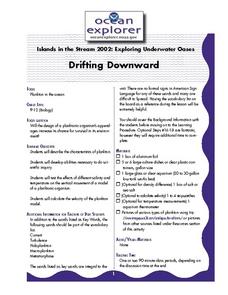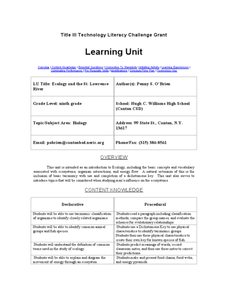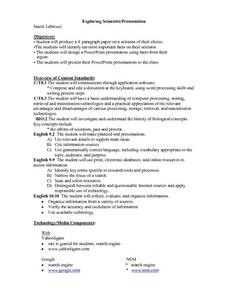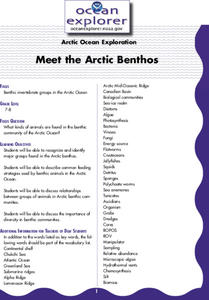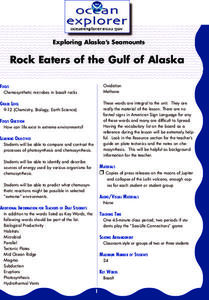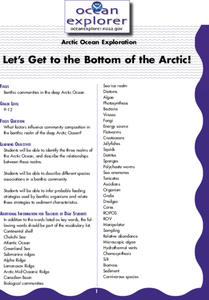Curated OER
Drifting Downward
Students study the effects of different salients and temperatures on vertical movement of an organism. In this experimental instructional activity students design different shapes of foil to simulate drifting planktonic organisms.
Curated OER
Seals, Corals, and Dollars...
Students explore the interdependence of animals and their habitat. In this Hawaiian ecology instructional activity, students work in groups to research the necessity of preserving precious coral as a habitat for monk seals. ...
Curated OER
Reef Fish Real Estate in the South Atlantic Bight
Students research a species of reef fish to determine its habitat requirements as both a juvenile and an adult. They use this information to create a pamphlet in the style of a real estate brochure that describe the habitat and food...
Curated OER
Hardy-Weinberg Equilibrium According to Hoyle:
Students gain a feeling for the significance of the Hardy-Weinberg Equilibrium without using algebra but participating in an interactice game.
Curated OER
Hardy-Weinberg Equilibrium According to Hoyle: OR, Population Genetics or Platypapyrus foursuitii
Learners use this exercise to help achieve a working knowledge of the Hardy-Weinberg Equilibrium without recourse to algebra. After participating in this activity, students gain a feeling for the significance of the Hardy-Weinberg...
Curated OER
Population - Technical Reading
Students analyze a technical article about population growth and present possible solutions.
Curated OER
Frog and Toad
Second graders use a Venn Diagram to compare and contrast buttons after listening to the story, A Lost Button.
Curated OER
Honey Bee Language Arts And Literature
Students see how nature and honey bees are presented in literature. They find and read poetry that include references to bees. Have them write their own poetry or Haiku.
Curated OER
Ecology and the St. Lawrence River
Ninth graders complete a unit of lessons on ecosystems, organism interactions, and energy flow. They create a key for known species of fish, diagram the movement of energy through an ecosystem, and create and present food chains and food...
Curated OER
Exploring Scientists/Presentation
Students research a scientist of their choice. They write a research paper on him or her. They select ten important facts from their research paper and prepare a PowerPoint presentation using their facts.
Curated OER
The Value of Behavioral Variation in Homo sapiens
High schoolers look at the behavioral characteristics of their peers from a historical perspective, and realize that, in the larger scheme of a community, these behaviors do have some value, and that a society as complex as ours does...
Curated OER
Limu and ME!
Students explore limu. In this cross curiculum botany and art project, students view a limu-picking film and then collect several species of limu. Students follow a sequence of instructions using limu, card stock and wax paper to create...
Curated OER
Meet the Arctic Benthos
Students recognize and identify major groups found in the Arctic benthos. They describe common feeding strategies used by benthic animals in the Arctic Ocean. They discuss relationships between
Curated OER
Rock Eaters of the Gulf of Alaska
Learners compare and contrast the processes of photosynthesis and chemosynthesis. They identify and describe sources of energy used by various organisms for chemosynthesis.
Curated OER
Let's Get to the Bottom of the Arctic!
High schoolers identify the three realms of the Arctic Ocean, and describe the relationships between these realms. They describe different species associations in a benthic community.
Curated OER
Mapping Seamounts in the Gulf of Alaska
Students describe major topographic features on the Patton Seamount, and interpret two-dimensional topographic data. They create three-dimensional models of landforms from two-dimensional topographic data.
Curated OER
Seals, Corals and Dollars
Students described the ecological relationships between Hawaiian monk seals and deep-water precious corals. They describe and explain at least two different viewpoints on how monk seals and precious coral resources
Curated OER
Lights in the Deep
Learners describe, compare, and contrast bioluminescence, fluorescence, phosphorescence, and chemiluminescence. They explain the role of three major components of bioluminescent systems. They ex
Curated OER
All That Glitters...
Students study that white light (visible light) is comprised of all colors of the spectrum. They study that the quantity of light decreases with increasing depth in the ocean. They study that the quality of light changes with increasing...
Curated OER
Spawn!
High schoolers explain that the ability of certain reef fishes to have a successful spawning is dependent on numerous environmental conditions. They list some of the factors needed by reef fishes in the South Atlantic Bight to have a
Curated OER
Feeling Crabby?
Students analyze data to investigate the influence of water depth on size among deep-water crabs. They interpret results from this data, and apply the results regarding appropriate fishery regulations.
Curated OER
Technology
Learners recognize descriptions of different types of biotechnology currently being used. They form persuasive arguments for or against that particular type of biotechnology.
Curated OER
Land Use Issues
In this unit of lessons, students examine analogies and parts of speech. They use land use issues to identify the different parts of speech that they research. They create analogies about the origin of organisms.
Curated OER
Light at the Bottom of the Deep, Dark Ocean?
Students participate in an inquiry activity. They relate the structure of an appendage to its function. They describe how a deepwater organism to its environment without bright light.


